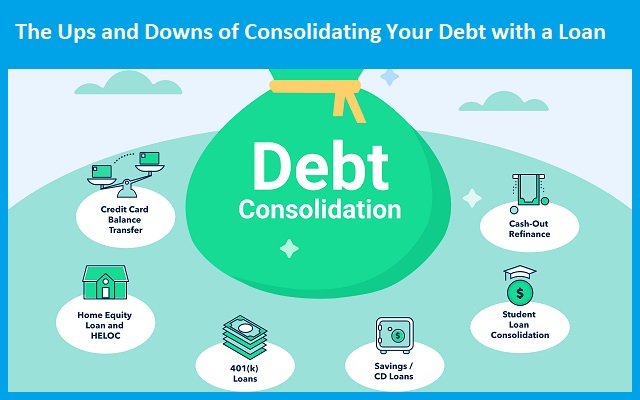Facing a maze of payments, interest rates, and stress from multiple debts can be overwhelming. Many individuals in this situation consider debt consolidation as a potential remedy to streamline their finances and alleviate the burden of debt. However, like any financial decision, debt consolidation has its own set of advantages and disadvantages that require careful consideration. In this comprehensive guide, we’ll explore both sides of the coin to help you weigh the options and make an informed decision about your financial future.

Understanding Debt Consolidation: Before diving into the pros and cons, it’s vital to grasp the essence of debt consolidation. Essentially, it involves merging multiple debts into a single loan with either a lower interest rate or more favorable terms. This can be achieved through various methods, such as taking out a personal loan, transferring balances to a low-interest credit card, or utilizing a home equity loan or line of credit.
The Upsides of Debt Consolidation:
1. Simplified Repayment: Consolidating your debts means dealing with just one monthly payment instead of juggling multiple due dates and interest rates. This simplicity can make it easier to stay organized and avoid missing payments.
2. Lower Interest Rates: By combining your debts into a single loan with a lower interest rate, you could save money on interest charges over the loan’s lifespan. This often leads to lower monthly payments and more manageable debt repayment, facilitating quicker payoff.
3. Fixed Monthly Payments: Many debt consolidation loans offer fixed interest rates and fixed monthly payments, providing stability and predictability in your repayment plan. This is particularly beneficial if you’re dealing with variable interest rates or fluctuating monthly payments on your existing debts.
4. Improved Credit Score: Successfully consolidating your debts can positively impact your credit score. Paying off multiple accounts and reducing your overall debt utilization ratio may lead to an improved credit score over time, making it easier to qualify for future credit opportunities.
5. Potential for Debt-Free Future: Debt consolidation can serve as a stepping stone towards financial freedom and debt-free living. By taking control of your debt and committing to a structured repayment plan, you can work towards eliminating your debt and building a stronger financial foundation.
The Downsides of Debt Consolidation:
1. Risk of Accumulating More Debt: Debt consolidation doesn’t erase your debt; it just restructures it. Without addressing the underlying issues that led to your debt, there’s a risk of reverting to old spending habits and accumulating more debt on top of your consolidated loan.
2. Fees and Costs: Depending on the consolidation method you choose, there may be associated fees and costs. For example, balance transfer fees, origination fees, and closing costs can add to the overall expense, diminishing potential savings from lower interest rates.
3. Potential Loss of Benefits: Consolidating federally backed loans may result in losing access to specific benefits or protections, such as income-driven repayment plans or loan forgiveness programs. It’s crucial to carefully weigh the trade-offs and consider the long-term implications.
4. Extended Repayment Terms: While debt consolidation may lower monthly payments, it could also extend the repayment term, prolonging the time to pay off your debt. This can increase the total interest paid over the loan’s life, offsetting any savings from lower interest rates.
5. Risk of Losing Collateral: Opting for a secured loan, such as a home equity loan, puts your assets at risk. Failure to repay the loan could lead to foreclosure or repossession, jeopardizing your financial security.
Making the Decision: Ultimately, whether to consolidate your debt with a loan should be a well-thought-out decision based on your unique financial situation, goals, and priorities. Take the time to assess your current debts, explore all available options, and carefully weigh the potential benefits and drawbacks. Seeking guidance from a financial advisor or credit counselor can help you evaluate your options and devise a personalized debt management plan.
Conclusion: Debt consolidation can simplify your finances, reduce interest rates, and accelerate your journey towards a debt-free life. However, it’s crucial to approach the process with caution, considering both the advantages and disadvantages. By weighing the pros and cons and seeking guidance when needed, you can make informed choices that pave the way towards a brighter financial future.
